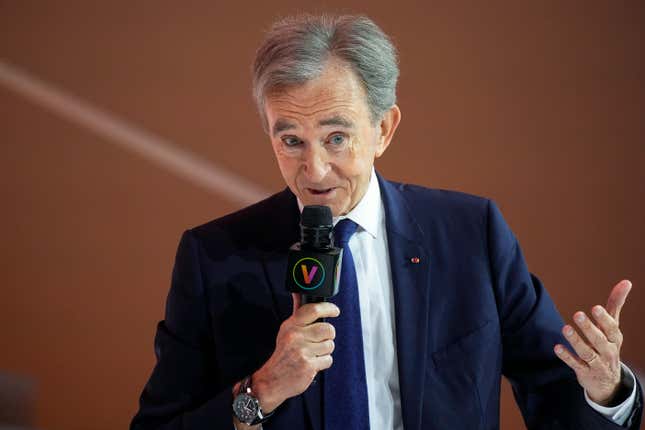
NEW YORK (AP) — The world might see its first trillionaire sooner than you think. And that puts a spotlight on today's richest 1%.
In an annual assessment of global inequalities published earlier this week, Oxfam International said the first trillionaire could emerge within the next decade — as the anti-poverty organization pointed to the growing wealth gap that skyrocketed globally during the COVID-19 pandemic.
Among the findings, Oxfam highlighted how the personal fortunes of the world's five richest people — Tesla CEO Elon Musk, Bernard Arnault and his family of luxury company LVMH, Amazon founder Jeff Bezos, Oracle founder Larry Ellison and investment guru Warren Buffett — have more than doubled since 2020.
To measure this jump, Oxfam pulled net worths from Forbes' real-time billionaires list as of March 2020 and the end of November 2023. Such lists fluctuate over time and even within hours — so while Buffett, for example, was the 5th richest person in November, he stood in 7th place per Forbes' Wednesday rankings.
Oxfam timed its report to the gathering of political and business elites in Davos, Switzerland, where the World Economic Forum meets annually. Numerous billionaires and multimillionaires also penned a letter calling on global leaders to fairly tax the super rich like themselves. Musk, Arnault, Bezos, Ellison and Buffett were not among the signatories — although Buffett has famously criticized the wealthy's lower tax rates and previously advocated for policy change in the same vein.
Here's a look at the wealth of these five billionaires spotlighted this week, and where their fortunes stand today.
Elon Musk is currently considered the world's richest person, with a net worth of $226.6 billion per Forbes' real-time rankings as of Wednesday. That's down from $245.5 billion as of November 2023.
In addition to being at the helm of Tesla, Musk is CEO of rocket ship company SpaceX. In 2022, he also purchased Twitter, which is now called X, for $44 billion. While he no longer serves as CEO of the social media platform, his still holds broad influence — and has faced ample pushback from issues ranging from content moderation and hate speech to alienating advertisers.
Bernard Arnault and his family currently hold a personal fortune of $175.1 billion per Forbes. That's down from about $191.3 in November 2023.
The French businessman has served as CEO of LVMH Moët Hennessy Louis Vuitton, the world’s largest luxury group, since becoming the majority shareholder in 1989. He is also president of the board for Groupe Arnault S.E., which is his family's holding company and primarily an investment firm.
Jeff Bezos' net worth stood at $173.6 billion Wednesday per Forbes. That's up from $167.4 billion in November 2023.
Back in 1994, Bezos founded Amazon out of a Seattle garage — and his wealth skyrocketed as the company grew into the e-commerce giant it is today. He stepped down as CEO in early 2021, but still has broad influence over Amazon as executive chair and the company’s biggest shareholder.
Larry Ellison currently has a personal fortune of $134.9 billion, according to Forbes, down from $145.5 in November 2023.
Ellison co-founded Oracle Corporation, a software and database management giant, in 1977 and served as CEO until 2014. He is now chief technology officer and chairman of the board. Ellison, who also had a stint on Tesla's board of directors from 2018 to 2022, has ranked high in billionaire lists for several years now.
At the time Oxfam pulled Forbes figures for its inequality report, Warren Buffett was the world's fifth richest person with a net worth of $119.2 billion. While his personal fortune has stayed relatively stable since ($119.5 billion as of Wednesday), Meta CEO Mark Zuckerberg and Microsoft co-founder Bill Gates have surpassed him in Forbes’ rankings with current net worths of $129.5 billion and $120.1 billion, respectively.
Over the years, Buffett has gained a reputation for his investment success and aggressive business tactics. He runs Berkshire Hathaway, a holding conglomerate that owns dozens of companies across sectors like insurance, manufacturing, utilities, transportation and retail.